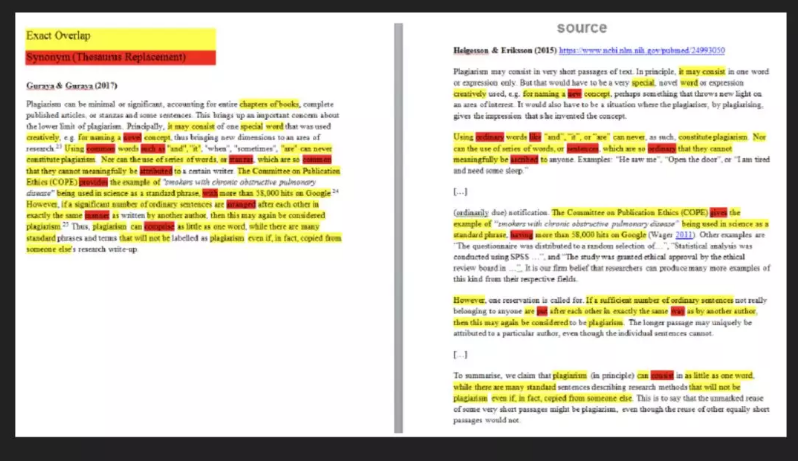如何远离论文剽窃的怪圈?
丁香园
什么是科研论文剽窃
科研论文剽窃可以说是一种极为严重且常见的学术不端行为了。几乎每年都会在各式的新闻中看到 xx 校 xx 教授、博士被举报,论文抄袭、剽窃…………
然而,何为论文剽窃,怎么样才算是论文剽窃呢?我以多年的英文论文写作经验谈谈论文剽窃这个事儿。
简单的说,所谓的剽窃(plagiarism)就是「偷」了别人的句子、工作或想法。
这是韦伯大辞典(「Plagiarize.」Merriam-Webster. 17 Apr. 2014)上对于剽窃的定义:

这个定义比较简明。我将「剽窃」按严重程度分为以下几种:
01 人神共愤
把别人的论文写上自己的名字,号称是自己写的。比如,在 2016 年吉林大学的一位硕士研究生学位论文,剽窃南京航空航天大学一位同学的论文,连章节小标题都几乎一样。2009 年东北财经大学一篇硕士学位论文则把南京某大学的一篇学术论文中的「江苏」换成「山东」。
02 天理不容
用了别人的数据、结果或者 idea,连致谢都没有。比如,很多师弟师妹啊,直接拿走了师兄辛苦做好的数据讲了组会,发了 paper,都没请师兄吃个饭,也没说在 paper 中致谢。(师兄 generously 送的除外。)
03 投机取巧
以上两种,都比较明显。「投机取巧」型的则显得不是那么容易被人察觉,也是我们初学写作时经常容易犯的。这些「投机取巧」的方式包括:
a)用同义词代提原文中的词,假装是你写的。作为好心,你还在致谢部分感谢了原文作者。
举个栗子:
「In the broadest sense, the metabolome is what we eat from a tomato fruit that determines the nutritional and consumption value of this important crop. Metabolomics analyses have been applied to Arabidopsis and some crops to reveal the natural variations in chemical composition (Luo, 2015). However, the changes in metabolism during the domestication process have been rarely studied. To our knowledge, this question has been only addressed at the metabolome level in a single study, but the genetic variations underlying the metabolite changes were not explored (Beleggia et al., 2016).」
—— 「Rewiring of the Fruit Metabolome in Tomato Breeding」 Zhu, Guangtao et al. Cell , 2018 Volume 172 , Issue 1 , 249 – 261(来源,Cell 2018 年一月刊)
同义词替换:
「In the rangiest perception, the metabolome is what we eat from a tomato fruit that determines the nutritional and utilization value of this vital crop. Metabolomics studieshave been applied to Arabidopsis and some crops to reveal the natural variations in chemical composition (Luo, 2015). But, the changes in metabolism during the subjugationprocess have been seldom studied. To our understanding, this question has been only addressed at the metabolome level in a single study, but the genetic variations underlying the metabolite alterations were not explored (Beleggia et al., 2016).」
b)替换了几乎所有的词,但是仍然保留了句子结构和关键短语,或者改变了句式,但保留关键短语等。
比如:
「Generally, what we get from a tomato fruit is the called the metabolome which determines the nutritional and utilization value of this vital crop. People (Luo, 2015) have applied metabolomics studies to Arabidopsis and some crops to reveal the natural variations in chemical composition. Although the changes in metabolism during the subjugation process have been seldom studied, this question has been only addressed at the metabolome level in a single study, but the genetic variations underlying the metabolite alterations were not explored (Beleggia et al., 2016).」
这次修改,不仅替换了同义词(加粗部分),还调整了句子结构(划线部分),保留了关键短语和短句。这应该是初学写作时经常用到的,但也算「剽窃」。在论文发表过程中,一字不差地 copy 两个词以上,都算是「剽窃」。
c)已经发表了一篇论文,第二篇论文的方法、实验手段和第一篇的差不多,就把第一篇的方法部分复制到第二篇。这种情况也是剽窃(self-plagiarism)。
具体的例子可参考:
http://www.turnitin.com/en_us/resources/blog/421-general/2554-is-recycling-your-own-work-plagiarism
以上,是比较常见的三种「剽窃」。
当然,很多初学者也并不是有意去剽窃。初学者由于词汇量或者知识背景不够,经常是无意识的。然而,除了可爱的导师们,几乎不会有人因为你是初学者,就论文超过 40% 的重复率置若罔闻。同时,「剽窃」实锤后,导致的后果也是极为严重的,比如取消学位申请资格,清除学籍,取消导师职位等等。 为了避免严重的事情发生,在平时的写作练习中,尤其要注意。
如何避免科研论文剽窃
几乎所有的「剽窃」都可以用一个办法、一句话解决:「Getting things into your own words」(用你自己的话表述出来)。然而,这不废话么,我要是能用自己的话表述出来,还有那么多问题吗?!
那么,问题来了,你为什么不能用自己的话表述出来呢?
除了上述的词汇量或者知识背景不够,依我个人的经验,这个问题主要来自于自己的学习和阅读习惯。在阅读论文的时候,经常会被作者逻辑严谨的思路和精妙绝伦的表述所吸引,以至于沉浸其中,无法自拔。读完,就把大段的文字粘贴在 word 里,心里还美滋滋的,感觉收获颇丰。当自己开始写论文的时候,就开始在自己的资料库中寻找,最终,一不小心陷入「剽窃」的怪圈。为什么呢?因为你所认为的收获,不过是别人知识的重复,你从来都没有把它变成自己的,你只是把它们收藏起来。
这就是症结所在。这个症结还反映出,你在阅读的时候根本就没有深入思考。任何论文都不能说是完美的。
知道了症结所在,就可以「对症下药」了。
所谓的「药」就是,养成良好的阅读习惯。每当读完一篇论文,或者一个知识点,花一些时间用自己的话写出来,或者在心里复述出来。
比如,在你读完以上所举的例子,可以简单的总结如下:
Generally, the metabolome determines the nutrition that we can get from the crops like a tomato fruit. Although people have analyzed the metabolomics of Arabidopsis and many crops (Luo, 2015), the metabolite changes during the process of domestication have not been well studied, especially the metabolite alterations of genetic variations (Beleggia et al., 2016). ——(Zhu, Guangtao et al. Cell , 2018)
改写之后,不仅加深了理解,知识也变成自己的了,写论文的时候还可以直接 copy 过去。
养成以上习惯,可以解决写文章时候遇到的 99% 以上的「剽窃」相关问题。
一些技巧
老实说,其实,可用且实用的技巧不是很多。这些技巧的核心就是,「透明化」,不能遮遮掩掩地引用别人的。比如,我上文取了个例子。如果我没有注明出处,那就涉嫌剽窃,于是,我用了引用符号「」,还仔细注明了出处。这是一种比较实用的技巧。即,大段引用,要用「」标出,并注明原出处,引用的时候不要改一个字。然后,就没有问题了。一般来说,科研论文很少有大段引用的内容。
另外,我最后总结的,就没有用「」,因为是已经 into my own words 了,但是还是在最后加了原出处,这是为了写文章的时候方面插入引文。
还有就是善用查重软件。最好用的也是最权威的就是 Turnitin,然而就是太贵。为了省钱,论文不到终稿,最好不要用。还有许多其他的网站,检查结果可作为参考。
如何避免剽窃,要点总结:
养成良好的阅读和思考习惯,做好笔记。
深入了解自己的研究内容,增加自己的知识背景。
了解「剽窃」的本质。
学习。如何引用论文等。
用好查重软件。
